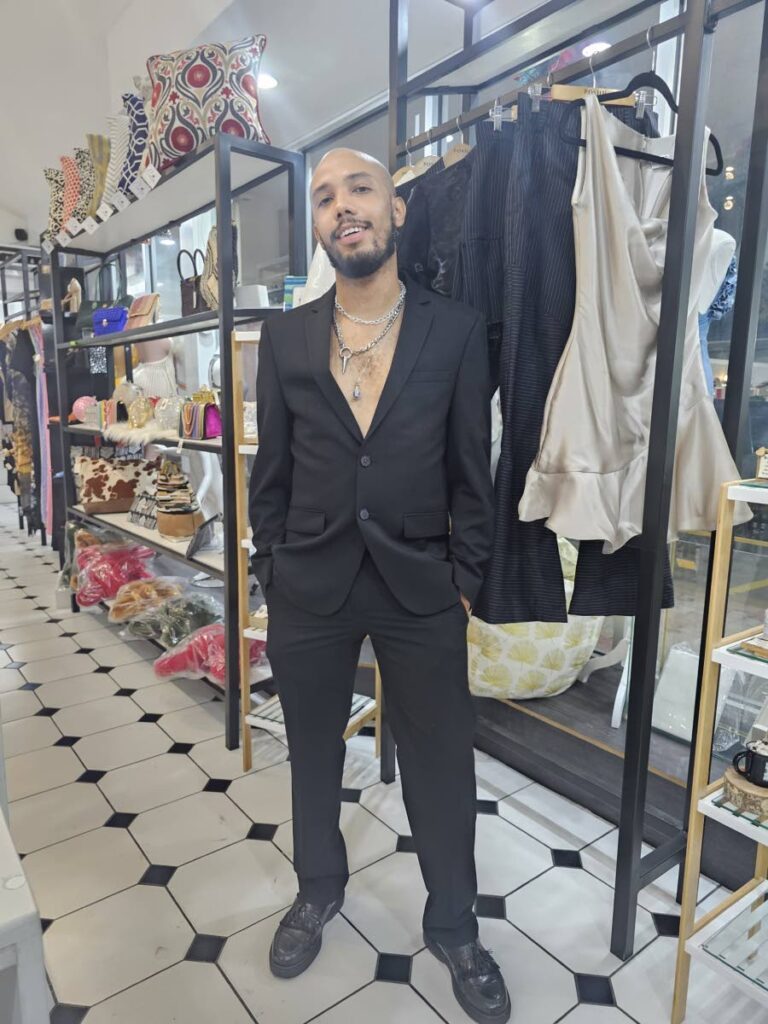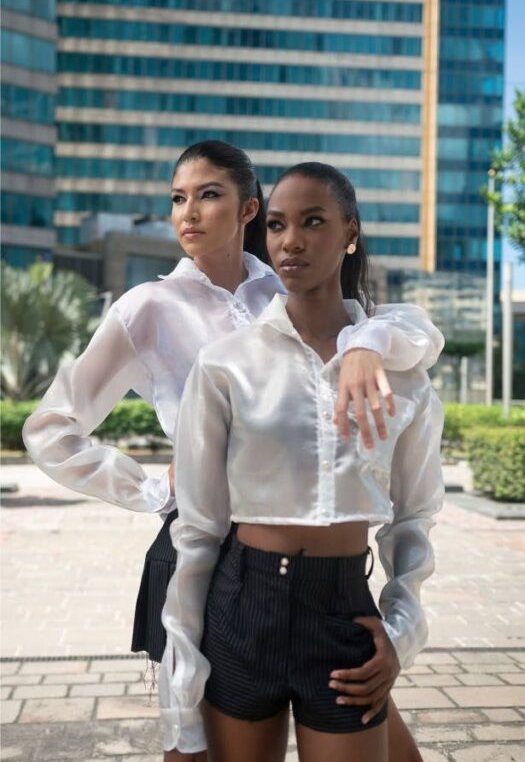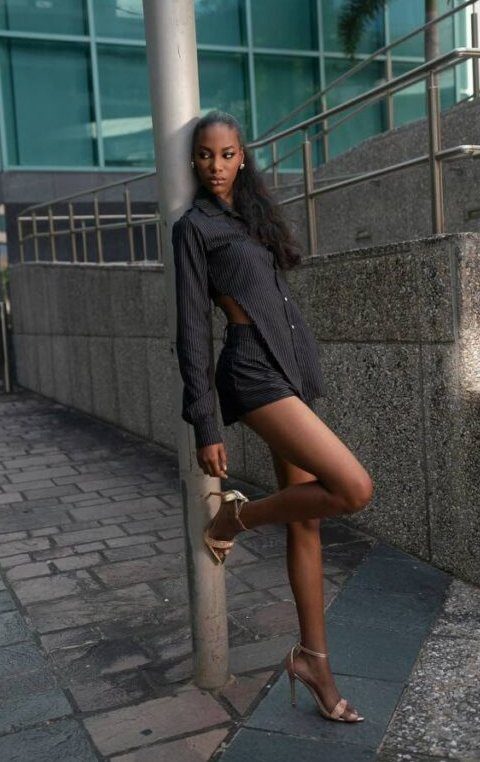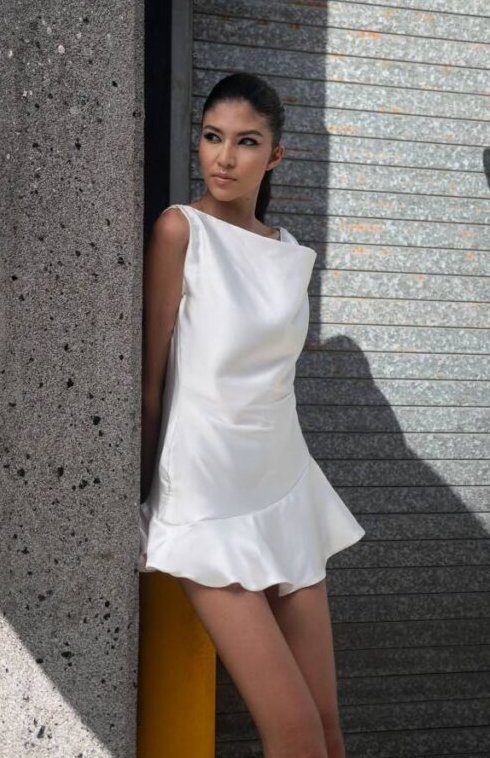Kambe wants to reshape workwear

DESIGNER and communications professional Kambe Lovelace, 31, considers himself one of a new generation of Trinidadians reframing how things look in the region.
Lovelace recently launched an eponymous six-piece collection that "reframes" workwear for women.
Lovelace’s frustration with the working system after 12 years inspired this collection.
“Although you will go to different companies, and that might be a new start, I found that there were a lot of the same things, a lot of the same rules, a lot of the same dress codes. You see a lot of the same things in corporate wear in Trinidad and Tobago and globally: you see the pinstripes, you see the white shirts.”
He decided to vent the feelings of being stifled into his art instead.
The six-piece collection consists of shorts, long pants, two retakes on the white shirt, a pleated skirt and a cowl-neck dress.
Lovelace redesigned workwear to make it “more wearable for outside.”

“That is the approach I took to designing this collection. A lot of what you will see is pinstripe; (in) some of them the edges are distressed, the patterns of the stripes collide – and so all of that came from that angst of, ‘Let’s just mess up workwear a bit.’”
He used fabrics like organza, silk, cotton and chiffon to give the collection a luxurious feel and look. Lovelace made silk – usually used to line clothing – the outerwear instead.
Although the global workplace has altered with the introduction of changes like being able to work from home, he did not design his collection for people who do so.
The rigidity of corporate Trinidad and Tobago still had a hold on society, he said.
“When you look at how you have to dress, certain companies wouldn’t allow women to wear sleeveless (outfits), which is a silly thing.”
Some organisations won't allow employees to wear jeans, even if they're not ripped.
“I still think in corporate spaces there is still a level of rigidity. I never understood why a denim well-tailored suit with the same silk lining wouldn’t be seen as something corporate but a cotton pinstripe suit would.”
This perspective was the genesis for Lovelace's collection.
His background also fuelled the kind of work he wanted to create.
He grew up seeing his father, mas designer, Keith Lovelace, enlarging his sketches and hanging them on the walls of his mas camp. Each year his father would design costumes for over 15 bands, such as Showcase Associates, Shell Invaders and Arima Boys' RC. He stopped designing in 2001, but was a major inspiration for his son.
“When I fully delved into the fashion industry around 2010 or 2012, I found a lot of the fashions did not really relate to the places I grew up in or the women and men I saw dressing.

“I grew up in Arima, and the things I saw every day were people putting on their uniforms, weekly uniforms. That was like Tetrex (a type of fabric) or some variation of the traditional idea of corporate (wear) that we’ve had.
“I grew up in the boroughs and, if I am going anywhere, it is to Port of Spain. I see the beach every so often, and I see a green backyard every so often.
“So I grew up with this very industrialised idea of TT.”
Hence while many think of the Caribbean aesthetic as pastels, flowy dresses and flora, Lovelace wanted to present something not often thought of when people refer to the Caribbean: the industrial side of TT.
The most he saw people “dressed up” was in their Sunday best and the only other times he saw people in “dressed up clothing” was while attending parties with his older siblings (he is the last of five).
Lovelace rarely saw the leisure side of TT.
“I never saw that part of the Caribbean, and I just remember thinking if I grew up in this space, there must be more people who grew up in this space.
“There are people who brunch, there are people who live closer to the beach and who live a relaxed lifestyle who can wear that.
“I feel we, as a people, have so much to offer and so much to say. I don’t think a lot of people in TT and the region, even though we have beautiful beaches and relaxing spots, I don’t think the mentality is as relaxed as those fashions might put forward.”

Some of his pieces are already available at Poshh Collections, Grand Bazaar, but the full collection will be available from January 2 there and at 36 Cornelio, Woodbrook.
Lovelace wants his pieces to be in stores so the public can interact with them.
“I think we have to be cognisant of what we are saying about ourselves, not just in fashion but in society.”
His brand was only launched last year and he was proud of it being in stores. Kambe is Lovelace’s second collection. The first had no name, but "played with" denim and bandanas. He said bandanas often went unnoticed, even though they're regularly used.
"People use bandanas for all sorts of things: as accessories for their pockets, to wipe their faces, tie their heads, etc.
“I thought, ‘How can we make this into a garment that is fashionable and says something without just being what it originally was?'”
Lovelace is only creating store-ready items at the moment, as custom orders are difficult to produce and he does not have the resources to do so. Three seamstresses and a tailor create his work, and he sources his fabrics from local stores like Jimmy Aboud as well as online.
Eventually he hopes to have a brand that is internationally recognised, but grounded in TT and Caribbean culture.

Comments
"Kambe wants to reshape workwear"